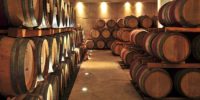
- This event has passed.
Saturday Wine Workshop: Oak / No Oak
April 28, 2018, 3:00 pm - 5:00 pm
$5
Few topics in the wine world are as polarizing as the use of oak.
Some wine lovers may cringe at the thought of it in their wine, but when the (oak) chips are down, who would say no to a glass of López de Heredia or well-aged Grange? The oak tree and the grape vine are crucial to the evolution of wine production; from their intermingling some of the world’s most treasured wine styles evolved. But this happened by accident; for thousands of years wine was kept in barrel for ease of transport rather than its effect on flavor. Right up until the triple advent of plastic, cardboard, and stainless steel in the early part of the 20th century, the barrel reigned supreme as the top container for shipping goods. Without oak, wine would be very different. Even older barrels that don’t impart much flavor are used for the sake of allowing their contents exposure to oxygen, which makes them develop all sorts of interesting secondary flavors. But oak isn’t right for all wine styles, and sometimes can be poorly applied. Some winemakers eschew its use in order to limit the wine’s contact with oxygen and preserve fruit and freshness. Alternative containers, particularly stainless steel, are utilized in this style of winemaking. For our Saturday tasting we’ll examine the same varieties, fermented and aged either with or without oak. We’ll examine how vital the role of the right container plays in winemaking, and take a second look at the woody plant responsible for some of the world’s most iconic wines.
- Craggy Range Sauvignon Blanc ‘Te Muna Road Vineyard’, 2016 $19
- Inglenook, Sauvignon Blanc Rutherford, 2014 $35
- Balletto, Chardonnay RRV ‘Teresa’s Unoaked’, 2016 $23
- Hartford Court, Chardonnay RRV, 2016 $30
- Alain Voge, Côtes du Rhône ‘Les Peyrouses’, 2015 $28
- Hickinbotham, Shiraz McLaren Vale ‘Brooks Road’, 2014 $81
The Tasting Table will be open 3.00pm-5.00pm
Reservations are not required.
$5 Tasting Fee.
Purchase $50 of wine and receive a $5 credit.
Reservations are not required.
$5 Tasting Fee.
Purchase $50 of wine and receive a $5 credit.
